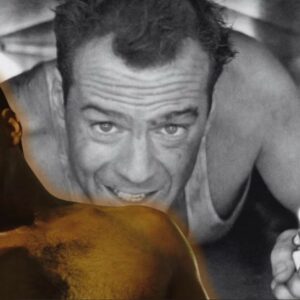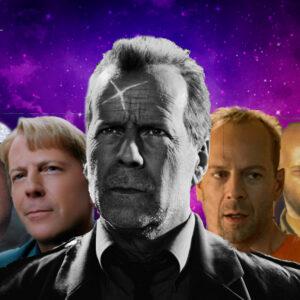Bruce Willis, an iconic actor with a career spanning over four decades, has made an indelible mark on modern cinema. Renowned for his versatility and ability to infuse depth into his roles, Willis has influenced various aspects of film, from the evolution of the action genre to the portrayal of complex characters. This article explores his contributions and the trends he has helped shape, demonstrating how his career has both reflected and inspired changes in the industry.
The Rise of the Action Hero
Bruce Willis revolutionized the action genre with his role as John McClane in the Die Hard series. Released in 1988, Die Hard redefined the action hero archetype. Prior to McClane, action heroes were typically portrayed as larger-than-life figures—invincible and often superhuman. They were frequently characterized by their physical prowess and a singular focus on brute strength.
Willis’s McClane was a significant departure from this mold. Unlike the traditional action hero, McClane was a relatable, vulnerable character. He was an ordinary New York cop who found himself in extraordinary circumstances. This vulnerability, combined with his sharp wit and everyman appeal, set a new standard for action heroes. McClane’s ability to maintain a sense of humor while facing life-threatening situations introduced a new dynamic to the genre. This blend of grit and humor became a template for subsequent action films and characters, encouraging a more human approach to the genre.
The success of Die Hard and its sequels demonstrated that audiences were ready for a more nuanced take on action heroes. Films like Lethal Weapon, Speed, and The Bourne Identity adopted this more grounded approach, featuring protagonists who were not only physically capable but also emotionally complex. Willis’s portrayal of McClane paved the way for these characters, proving that action heroes could be flawed, relatable, and multidimensional.
Genre-Bending Performances
Willis’s career is marked by his willingness to explore various genres, showcasing his versatility as an actor. While he is best known for his roles in action films, his performances span sci-fi, thrillers, drama, and comedy. This genre-bending approach has been instrumental in challenging the perception of him as solely an action star.
One of Willis’s most significant roles outside the action genre is in M. Night Shyamalan’s The Sixth Sense (1999). In this psychological thriller, Willis played Dr. Malcolm Crowe, a child psychologist who encounters a young boy who can see and communicate with the dead. Willis’s performance in The Sixth Sense was a departure from his action-hero persona, demonstrating his ability to convey emotional depth and complexity. The film’s success not only solidified Willis’s reputation as a versatile actor but also helped to challenge the typecasting that often confines actors to specific genres.
Willis’s willingness to take on diverse roles has paved the way for actors to cross genre boundaries. His success in different types of films has shown that actors can achieve critical acclaim and commercial success regardless of the genre they choose. This trend has led to more nuanced roles in contemporary cinema, with actors increasingly being recognized for their versatility and ability to adapt to different storytelling styles.
The Anti-Hero and Complex Characters
Willis’s performances often feature flawed, morally ambiguous characters. This trend is particularly evident in films like Pulp Fiction (1994) and Sin City (2005). In Pulp Fiction, Willis played Butch Coolidge, a boxer who becomes entangled in a violent underworld. His portrayal of Butch, a character with a troubled past and questionable motivations, highlights Willis’s skill in embodying complex anti-heroes.
Similarly, in Sin City, Willis portrayed Hartigan, a retired cop with a tarnished reputation who becomes embroiled in a grim and morally ambiguous world. Willis’s ability to portray these flawed, morally ambiguous characters reflects a broader trend in modern cinema towards more sophisticated character development. These characters are not defined by traditional heroism but by their complexity and inner struggles.
The shift towards anti-heroes and morally ambiguous characters has influenced the types of roles offered to actors and the stories being told. This trend emphasizes depth and realism over traditional heroism, reflecting a growing preference for characters who are more relatable and multidimensional. Willis’s contributions to this trend have helped to redefine the possibilities for character development in film, encouraging filmmakers to explore more complex and nuanced narratives.
Influence on Independent Cinema
In addition to his work in major blockbusters, Willis has also made significant contributions to independent cinema. His involvement in films like The Cooler (2003) and Glass (2019) demonstrates his support for diverse storytelling and innovative filmmaking.
The Cooler, a film directed by Wayne Kramer, features Willis in a supporting role as a casino owner. The film’s exploration of themes such as luck, redemption, and personal struggle reflects Willis’s willingness to engage with unconventional narratives. His participation in the film brought attention to independent cinema and helped to bridge the gap between mainstream and independent storytelling.
Similarly, Glass, directed by M. Night Shyamalan, is a continuation of Shyamalan’s Unbreakable (2000) and Split (2016). Willis’s return to the role of David Dunn in Glass demonstrates his commitment to collaborative storytelling and innovative filmmaking. By choosing to work on independent projects, Willis has encouraged collaboration and experimentation, supporting the growth of independent cinema.
Willis’s influence extends beyond his performances, as his involvement in independent projects has helped to highlight the importance of diverse storytelling and creative risk-taking. His contributions to independent cinema have inspired other actors and filmmakers to explore unconventional narratives and push the boundaries of traditional filmmaking.
Legacy and Continuing Influence
Bruce Willis’s impact on modern cinema extends far beyond his film roles. His approach to acting has inspired a generation of performers and filmmakers to embrace risk and challenge conventions. Willis’s ability to blend humor with action, portray complex characters, and explore various genres has set a new standard for actors and filmmakers alike.
His influence is evident in the continuing evolution of cinema, where character complexity and genre-blending are increasingly celebrated. The trends that Willis has helped shape—such as the rise of the relatable action hero, the exploration of complex characters, and the blending of genres—are now integral to contemporary filmmaking. His career serves as a testament to the power of versatility and innovation in the film industry.
In conclusion, Bruce Willis’s lasting impact on modern cinema is a testament to his exceptional talent and willingness to push boundaries. His contributions to the action genre, genre-bending performances, portrayal of complex characters, and support for independent cinema have reshaped the landscape of filmmaking. As cinema continues to evolve, Willis’s influence will remain a significant part of the industry’s history, inspiring future generations of filmmakers and actors to embrace creativity and challenge conventions.





